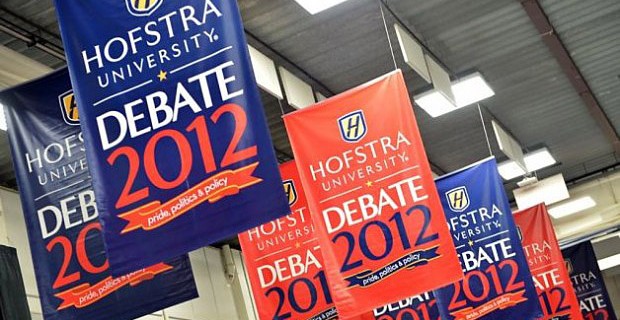
The most interesting moment of the second 2012 presidential debate came in the final minutes, when Barry Green, the last of the 82 supposedly undecided voters handpicked by the Gallup Poll, asked Governor Mitt Romney to describe the biggest misperception that the American people have about him as a person and a candidate. Predictably, he took the opportunity to declare that he cares about “100 percent of the American people,” allowing President Obama to remind those watching that it was Governor Romney himself who had left the impression that perhaps he did not care about 47 percent of his fellow countrymen.
But that was only the lead-in to what I found the most fascinating moment. After a few more predictable lines, followed by the briefest of pauses, Governor Romney suddenly transitioned into a discussion of his faith. “My passion probably flows from the fact that I believe in God”—a not so subtle challenge to Obama to respond in kind, which the President did not do— “and I believe we’re all children of the same God.”Did he just go there? Yes, I think he did.
I had been waiting throughout the interminable “town-hall style” debate for someone to reprise the infamous question asked of President Bill Clinton in a 1994 MTV town-hall meeting, but this time with a twist: “Boxers or briefs, or sacred shorts?” No one, however, had the courage, or even the sense of humor, necessary to depart from his previously approved question. But now Governor Romney himself had brought Mormonism into the mix. Perhaps he had done so unintentionally, but making a statement that a Christian candidate would find unnecessary— “I believe we’re all children of the same God”—was bound to remind those who know something of the religion founded by Joseph Smith that Mormonism teaches we are literally the corporeal offspring of the Heavenly Father, and even that, until 1978, Mormonism had taught that the dark skin of such men as President Obama was the mark of Cain. This was, in his own limited way, Mitt Romney’s Jack Kennedy moment. And it was a reminder that, for good and ill, Governor Romney is no Jack Kennedy.
For someone long fascinated with this most American of religions, those few brief words almost made the entire evening worthwhile. Because in every other respect, in spite of the evident tension and vitriol between Governor Romney and President Obama, this debate was a non-debate.
Yes, each man claimed that he disagreed with the other—over education, unemployment, energy policy, taxes, immigration, outsourcing—and each claimed that the other had misrepresented his positions. And both made a run to the middle—but it was a middle far to the left of the consensus in 2000, let alone 1992 or 1980. Virtually every question asked by the town-hall crowd concerned areas that, constitutionally, belong to the states or the people rather than to the federal government. It is no surprise that President Obama finds “equal pay for equal work” a pressing federal question; but when Phyllis Schlafly worked tirelessly to defeat the Equal Rights Amendment, I doubt that she anticipated the day when a Republican nominee for president would declare that what is necessary is equal pay for less work—which is what Romney’s call for “flexible hours” for female employees amounts to in practice.
Similarly, despite his pledge to kill Obama’s contraceptive mandate on Inauguration Day 2013, Governor Romney went out of his way to assure all those watching the debate that he, like President Obama, believes that “every woman in America should have access to contraceptives.” For his part, President Obama advocated economic nationalism in words that could have been torn from a column by Pat Buchanan, and extolled the role of traditional families, despite his endorsement of attempts to redefine marriage.
Anyone who could find a dime’s worth of difference between Governor Romney and President Obama in this debate had already made up his mind to do so before the debate started. Both men pledged to cut taxes on the middle class and small businesses and accused the other of lying about doing so. Both were adamant that illegal immigration must cease, but that all immigrants here illegally must be given a path to legalization. Governor Romney offered to staple a green card to the diploma of every college graduate in the entire world, while President Obama declared that anyone who thinks of himself as an American should be able to become an American (presumably even without a college diploma). Both promised to reduce the deficit while expanding funding for education and domestic sources of energy, and both claimed that the other could not do so.
I am in the frustrating yet enviable position of living in a state where the outcome of this election is not in doubt. Obama will sweep Illinois, as he did in 2008. That’s frustrating, because I sincerely want to see this most anti-Catholic of presidents deprived of a second term. It’s also enviable, because I don’t find it necessary to convince myself that Romney is the Second Coming of Ronald Reagan, much less Jesus Christ.
And so, instead of yelling at the television as I once did, I shook my head while watching two grown men snipe at each other as if they were teenagers, and reflected on how far this country has moved to the left since 1980, the first election in which I was fully politically aware. And while I can say with certainty I won’t be voting for Barack Obama, I can walk into the voting booth on November 6 in perfect freedom, unburdened by the delusion that the fate of the United States depends on Mitt Romney, much less on me.
“Put not your trust in princes, in the children of men, in whom there is no salvation…. The Lord shall reign for ever: thy God, O Sion, unto generation and generation” (Psalm 146:3,10).


No comments:
Post a Comment